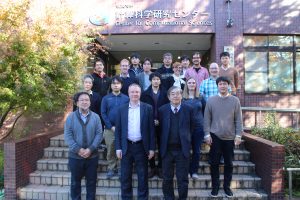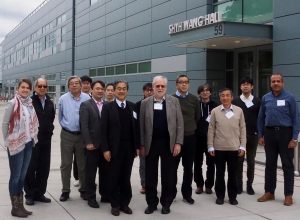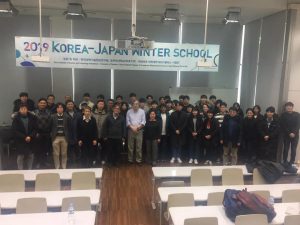Toward Formation of the International Hub of Computational Sciences
Head: INAGAKI Yuji
The Center for Computational Sciences (CCS) conducts research activities grounded in the central concept of “Multidisciplinary Computational Science” through collaboration and cooperation among various computer-related and scientific fields. The Liaison Office for Multidisciplinary Computational Sciences is a key part of the Center’s efforts aimed at maintaining its position as an international hub for computational science information.
Cooperation among Different Fields
In order to promote multidisciplinary computational science, cooperation among different fields is essential. In 2011, using the research results of first-principles electronic state calculation for 100,000 atom silicon nanowires using K computer, a research group from RIKEN, the University of Tsukuba, the University of Tokyo, and Fujitsu Limited won the Gordon Bell Prize for Peak-Performance, which is recognized as an outstanding achievement in high-performance computing. This is just one of the results of cooperation among different fields that have taken place at the Center for the past years.
International Cooperation
As for international cooperation, partnership agreements have been concluded between the University of Tsukuba and the University of Edinburgh in the UK, as well as with Lawrence Berkeley National Laboratory in the US. Furthermore, as part of the efforts to deepen the computational science research exchanges, the CCS and the University of Edinburgh Parallel Processing Center (EPPC) are currently hosting joint symposiums, and the Center is co-sponsoring workshops with Lawrence Berkeley National Laboratory.
 Collaboration workshop between CCS and the University of Edinburgh, 2019
Collaboration workshop between CCS and the University of Edinburgh, 2019
 Collaboration workshop between CCS and Lawrence Berkeley National Laboratory,2019
Collaboration workshop between CCS and Lawrence Berkeley National Laboratory,2019
 Japan-Korea HPC Winter School, 2019
Japan-Korea HPC Winter School, 2019
Multidisciplinary Pioneering Program
The multidisciplinary pioneering program encourages the promotion of research efforts that require collaboration and cooperation among divergent scientific fields. Cooperation between the computational physics (science) and numerical analysis (engineering) fields in order to implement calculation code with high execution efficiency and to perform the necessary large-scale simulations using the code is one of our program activities. There are also projects that aim at new research deployments and developments by facilitating organic cooperation among different fields utilizing the same techniques in computational science. The multidisciplinary pioneering program has support from the collaborative multidisciplinary program of the center.
Organization for Collaborative Research on Computational Astrobiology
In the last decade, the field of “Astrobiology” has attracted a significant deal of attention owing to advanced observations of extrasolar planets as well as interstellar molecules. This organization aims at the creation of computational astrobiology by exploring key processes related to the origin of life in the universe through ab initio calculations based on collaboration among the Computational Astrophysics, Computational Biology, Computational Planetary Science, and Computer Science fields.
These research efforts are focusing on the analysis of the potentials of interstellar molecular biology, planetary biology, and the astrophysics of star and planet formation.
List of Past Workshops
Joint Workshops for CCS and the University of Edinburgh(EPCC)
2021 3/25 @Online
2019 12/3-4 @CCS
2018 12/3-4 @EPCC
2017 12/7-8 @CCS
2016 6/16-17 @EPCC
2015 3/9-10 @EPCC
Joint Workshops for CCS and Lawrence Berkeley National Laboratory(LBNL)
2021 3/26 @Online
2019 3/6-7 @LBNL
2018 3/5-6 @CCS
2017 4/20-21 @LBNL
2016 5/12-13@CCS
2015 5/28-29 @LBNL
2014 4/10-11 @CCS
Joint Winter Schools for CCS and KISTI
2018 2/20-22 @CCS
2017 2/21-23 @University of Seoul
2016 2/15-16 @CCS
2015 1/20-22 @Seoul National University
2014 2/24-27 @CCS
List of MOU(2021.9.10)
| Lawrence Berkeley National Laboratory (ローレンスバークレー国立研究所) |
| Univaersity of Alaska Fairbanks, U.S.A (アラスカ大学フェアバンクス校) |
| University of Bergen (ベルゲン大学) |
| CENTRE FOR VISION, SPEECH & SIGNALPROCESSING, UNIVERSITY OF SURREY (サリー大学) |
| CURTIN UNIVERSITY (カーティン大学) |
| VNU UNIVERSITY OF SCIENCE, VIETNAM NATIONAL UNIVERSITY, HANOI (ハノイ自然科学大学) |
| THE UNIVERSITY OF MISSOURI(MU), USA (ミズーリ大学) |
| INSTITUTE OF CHEMISTRY – CENTER FOR GLYCOMICS, SLOVAK ACADEMIY OF SCIENCE, SLOVAKIA (スロバキア科学アカデミー) |
| UNIVERSITY OF SCIENCE AND TECHNOLOGY OF HANOI (ハノイ工科大学) |
| DEPARTMENT OF CHEMISTRY, UNIVERSITY OF ILLINOIS URBANA-CHAMPAIGN, U.S.A. (イリノイ大学アーバナシャンペーン校化学科) |
| INSTITUTE OF ATOMIC AND MOLECULAR SCIENCES, ACADEMIA SINICA, TAIWAN (台湾アカデミア・シニカ原子分子科学研究所) |
| INSTITUTE OF CHEMISTRY, ACADEMIA SINICA, TAIWAN (台湾アカデミア・シニカ化学研究所) |
| URBAN CLIMATE REASARCH CENTER, ARIZONA STATE UNIVERSITY, USA (アリゾナ州立大学気候研究センター) |
| The School of Phyisics and Astronomy , The University of Edinburgh , The United Kingdom (エジンバラ大学) |
| University of Alaska Fairbanks , USA (アラスカ大学フェアバンクス校) |
| The Regents of the University of California (カリフォルニア大学) |
| Royal Meteorologocal Institute of Belgium (ベルギー王王国王立気象研究所) |
|
Cooperation for 4 countries |
(Update: Sep. 17, 2021)
